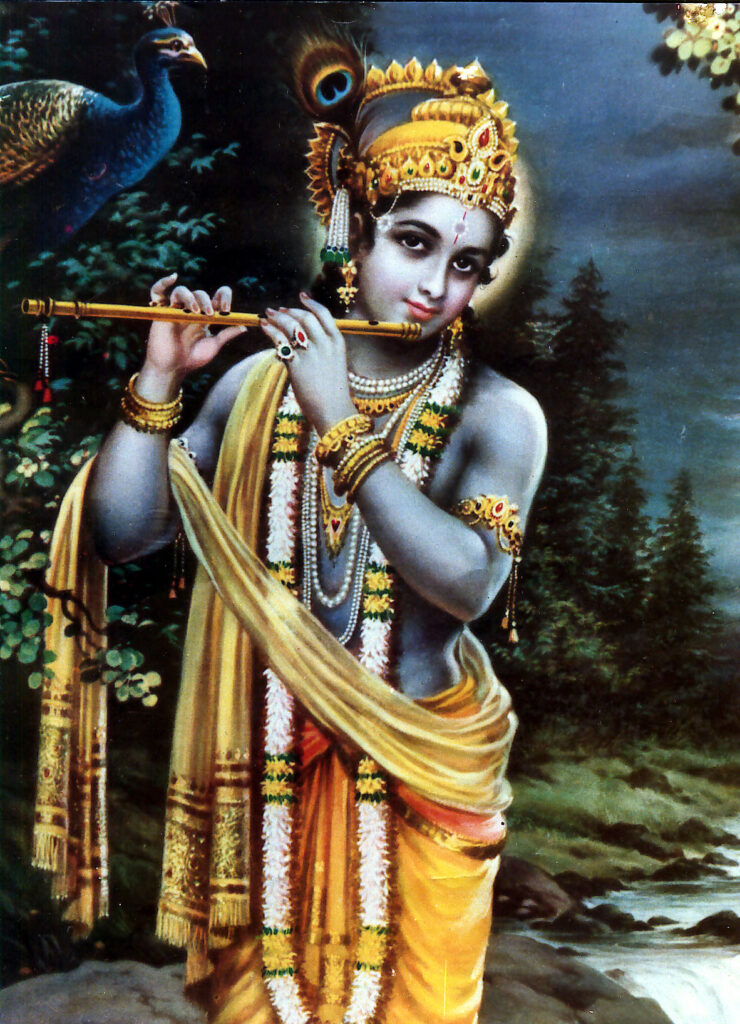
Worship of the Demigods
Many people say that Lord Vishnu is the original Personality of Godhead, and that Krishna is the eighth avatar of Lord Vishnu – they are saying that Vishnu is the original form of God, and that Krishna is His expansion. This is what you’d read if you were to look up “Krishna” in an encyclopedia, dictionary, Wikipedia etc.
However, this view is not supported by Vedic scripture. The Vedas, in numerous places, establish that Krishna is the original Supreme Personality of Godhead, and that Lord Vishnu (Narayana) and all other avatars and expansions of the Lord, such as Rama, Narasingha, Varaha, Maha-Vishnu etc. spring from the original form of Lord Krishna. Lord Brahma, the creator of the universe and head of our disciplic succession, prayed:
Krishna, Who is known as Govinda, is the Supreme Godhead. He has an eternal blissful spiritual body. He is the origin of all. He has no other origin and He is the prime cause of all causes.
[Brahma Samhita 5:1]
I worship Govinda, the primeval Lord, Who is the original personality of Godhead. By His partial plenary expansion (Maha Vishnu), He enters into material nature, and then into each and every universe (as Garbodakasayi Vishnu), and then (as Ksirodakasayi Vishnu) into all the elements, including every atom of matter. Such manifestations of cosmic creation are innumerable, both in the universes and in the individual atoms.
[Brahma Samhita 5:35]
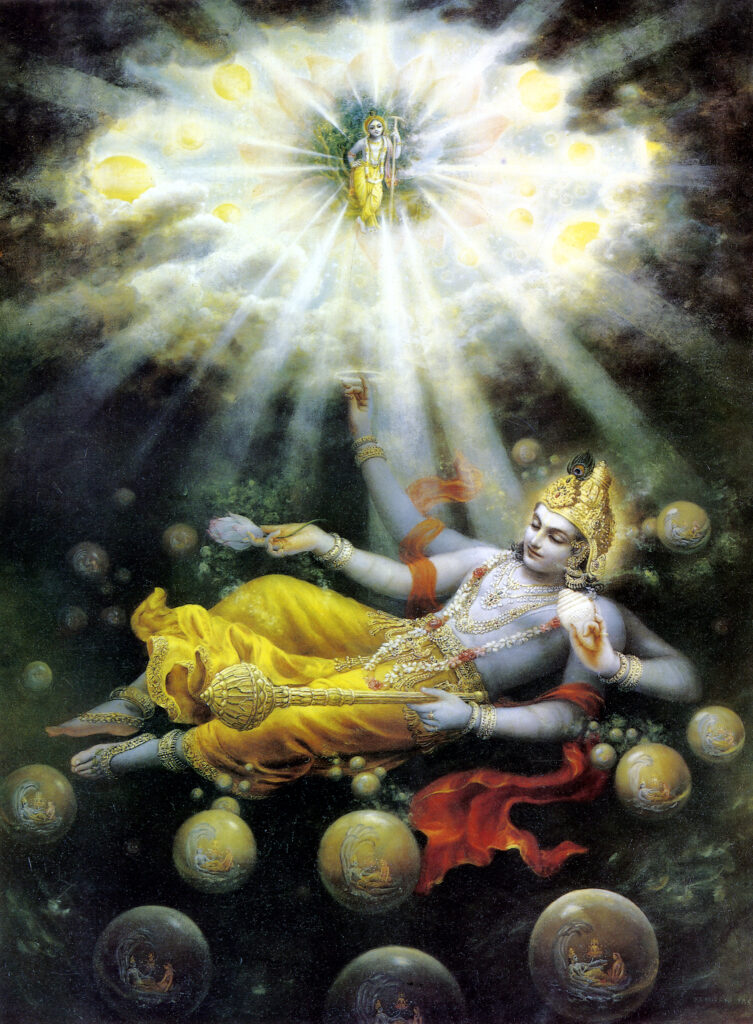
This Sri Krishna is no other than the inconceivable, original Personality of Godhead. He is the first Narayana, the Supreme enjoyer. But He is moving amongst the descendents of King Vrsni, just like one of us and He is bewildering us with His self-created energy.
[Srimad Bhagavatam 1:9:18] (Spoken by Grandfather Bhisma)
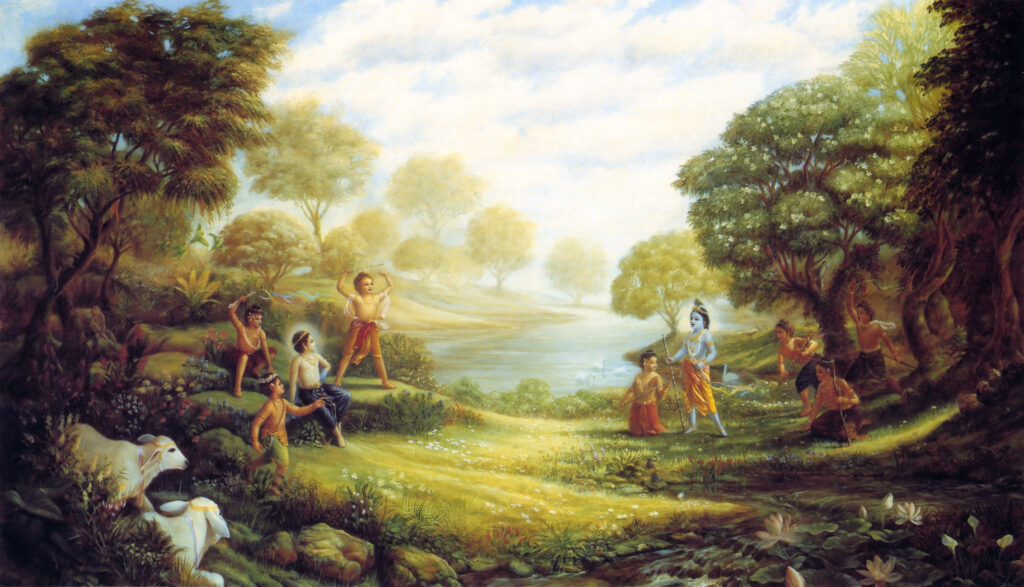
Krishna is the origin of Lord Vishnu. He should always be remembered and never forgotten at any time. All the rules and prohibitions mentioned in the sastras should be the servants of these two principles.
[Padma Purana: quoted C.c. Madhya 22:113]
It is also claimed by some religious sects, based on misinterpretations of the Vedas, that certain demigods such as Brahma, Shiva, Ganesh, Vivaswan (Surya, the sun-god) or Goddess Kali are supreme. Certain parts of Vedic scripture glorify various “ishvaras” (controller gods) and recommend worship of these demigods for various material rewards. Generally those who are enamored by the prospect of fulfilling their material desires, will chose to see their chosen demigod as supreme. Krishna says of demigod worship that its fruits are limited and temporary.
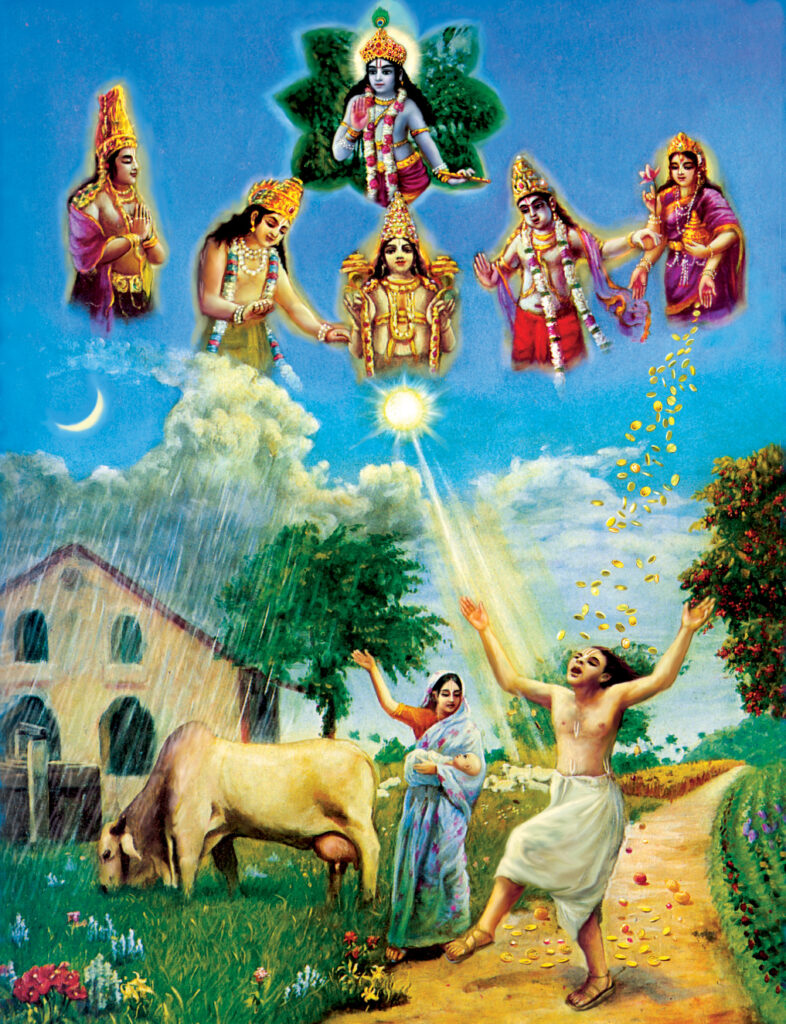
The Role of the Demigods
The demigods are servants of the Supreme Lord in charge of various aspects of universal affairs. As an example, we may have a King who has ultimate control of his kingdom but he is not directly involved in the day-to-day running of the kingdom. Instead, he appoints ministers to be in charge of certain portfolios like roads and hospitals etc. In the same way, the Supreme Lord enjoys pastimes of love with His devotees in the spiritual world while empowering great demigods to manage universal affairs in the material universes. The demigods are all servants of the Supreme Lord. Many are great devotees of the Lord. Lord Brahma and his son Narada Muni are great spiritual masters in our line of disciplic succession, and we respect Lord Shiva is one of the greatest devotees of Lord Krishna – he is always in trance, meditating on Lord Krishna. So, it is not wrong to respect and worship demigods, but only as devotees of the Lord, not as the Supreme Lord. As soon as we put any devotee or demigod on an equal level with the Lord, or call Him Supreme, we commit an offence.
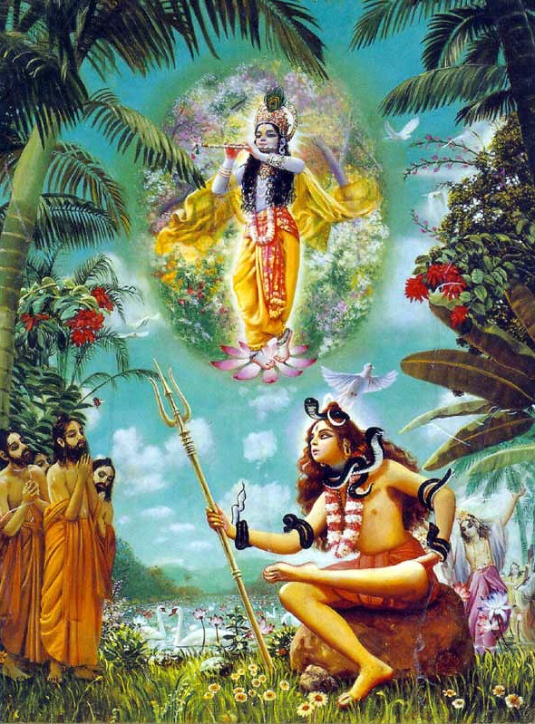
As an example, we worship Lord Jesus Christ as a great devotee of the Lord, and this is proper. But many people say that Jesus is God, and thus they ignore his instruction to love God. This is not pleasing to Jesus – no devotee wants to be called God or worshiped as God, but it is proper and wonderful to worship a great devotee as the servant of the Lord. Jesus said,
I have not come to do my will, but the will of the one who sent me. My Father in heaven is far greater than I.
He did not claim to be or seek to be worshiped as the Supreme Being, but was always the most humble servant of the Lord.
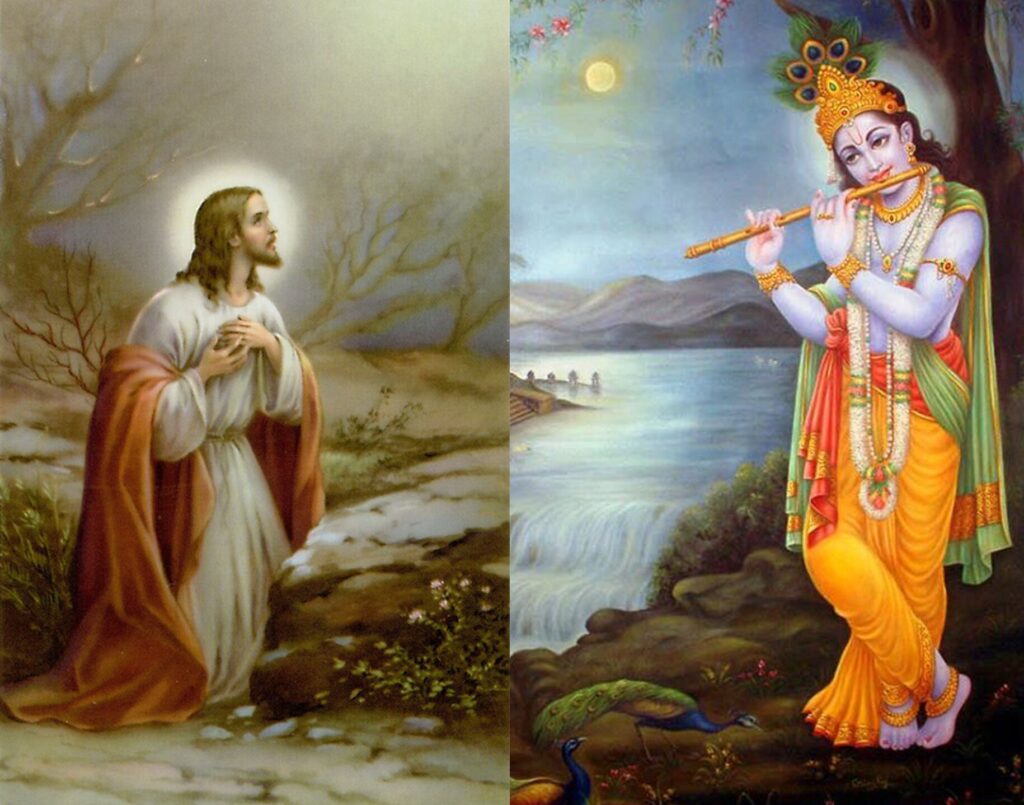
So, many people worship various demigods instead of worshiping Krishna, and this is where the problem arises. Or they say you can worship any God – Shiva, Ganesh, Laxmi or Krishna – it doesn’t matter which one. This is wrong. The Vedas very clearly establish that Krishna is Supreme and all living entities, from the demigods to the tiny insects etc. are His servants in various stages of remembrance or forgetfulness of our relationship with Him. We should respect the demigods as being servants of Krishna, but place our love first and foremost on Krishna Himself.
If we love and serve Krishna, all of the demigods and all of the great devotees will be pleased with us. The analogy is given that it is of little value watering the individual leaves of a plant, but if we water the root of the plant then all of the parts of the plant – the roots, stems, branches and leaves – will all benefit. So, Krishna, God, is the root of all existence and if He is worshiped it is natural that we will love all other living beings who are His parts and parcels. But if we focus our attention on the parts and parcels and neglect Krishna, we will suffer and those we place our worship on will also not benefit or be satisfied. No one can be truly happy without loving Krishna, because that is the natural function and condition of all souls.
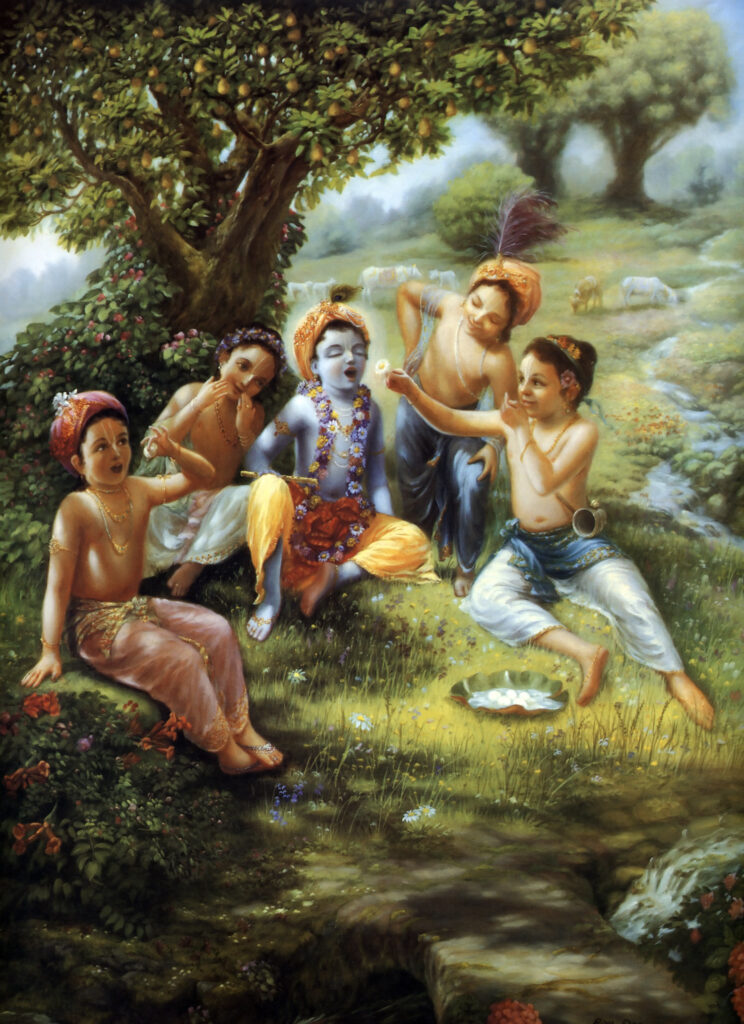
The Flowery Words of the Vedas
Men of small knowledge are very much attached to the flowery words of the Vedas, which recommend various fruitive activities for elevation to the heavenly planets, resultant good birth, power and so forth. Being desirous of sense gratification and opulent life, they say that there is nothing more than this.
[Bhagavad-gita 2:42-43]
Srila Bhaktivedanta Swami says in the purport to this verse:
People in general are not very intelligent, and due to their ignorance they are most attached to the fruitive activities recommended in the karma-kanda portions of the Vedas. They do not want anything more than sense gratificatory proposals for enjoying life in heaven, where wine and women are available and material opulence is very common.
In the Vedas, many sacrifices are recommended for elevation to the heavenly planets, especially the jyotistoma sacrifices. In fact, it is stated that anyone desiring elevation to heavenly planets must perform these sacrifices, and men with a poor fund of knowledge think that this is the whole purpose of Vedic wisdom. It is very difficult for such inexperienced persons to be situated in the determined action of Krishna consciousness. As fools are attached to the flowers of poisonous trees without knowing the results of such attractions, unenlightened men are similarly attracted by such heavenly opulence and the sense enjoyment thereof…
[From purport to B.g. 2:42-43]
Men of small intelligence worship the demigods, and their fruits are limited and temporary. Those who worship the demigods go to the planets of the demigods, but My devotees ultimately reach My supreme planet.
[Bhagavad-gita 7:23]
Lord Brahma explains in the Second Canto of Srimad Bhagavatam:
I create after the Lord’s creation by His personal effulgence (known as the brahmajyoti), just as when the sun manifests its fire, the moon, the firmament, the influential planets and the twinkling stars also manifest their brightness. … Inspired by Him only, I discover what is already created by Him (Narayana) under His vision as the all-pervading Supersoul, and I also am created by Him only.
[Srimad Bhagavatam 2:5:11,17] (Brahma to Narada)
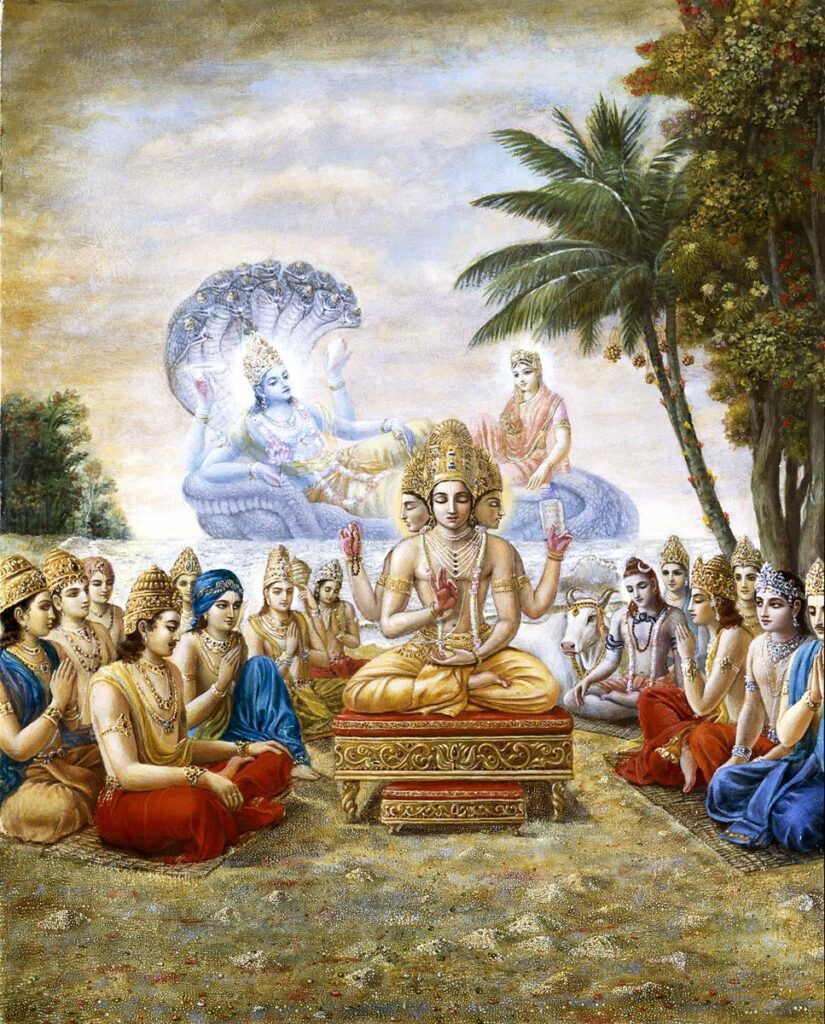
My dear Krishna, when You order Brahma, ‘Now you may create the universe,’ and when You order Shiva, ‘Now you dissolve this material manifestation,’ You are in this way creating and dissolving the material creation Yourself. Simply by Your orders and by Your partial representation of Vishnu, You are maintaining the universes. In this way, O Krishna, O enemy of Kamsa, there are so many Brahmas and Shivas who are simply carrying out Your orders.
[Bhakti-rasamrta-sindhu – Nectar of Devotion ch. 22]
Offences against the Holy Names of the Lord
The Padma Purana lists ten offences against the chanting of the Lord’s Holy Names, which, if committed and not rectified, will greatly impede the effectiveness of our chanting Krishna’s names, slowing or interrupting our spiritual growth. The second offence regards thinking or suggesting that the names of the demigods or mundane personalities are somehow equal or superior to Krishna’s (or Lord Vishnu’s) names.
(2a) To deny that Lord Vishnu (or Krishna) is the Absolute Truth. There is no difference between His name, quality, form, pastimes and activities, and one who sees a difference is considered an offender.
(2b) Also, if one thinks the Lord’s names are non-different from the names of the demigods, he offends. The Supreme Lord and the demigods should never be considered on an equal level. Nor should we discriminate against any particular name of the Lord as it is locally understood – all are as holy as the other.
There is no difference between the holy name of the Lord and the Lord Himself. As such, the holy name is as perfect as the Lord Himself in fullness, purity, and eternity. The holy name is no material sound vibration, nor has it any material contamination.
[Padma Purana. Quoted Nectar of Devotion ch.12]
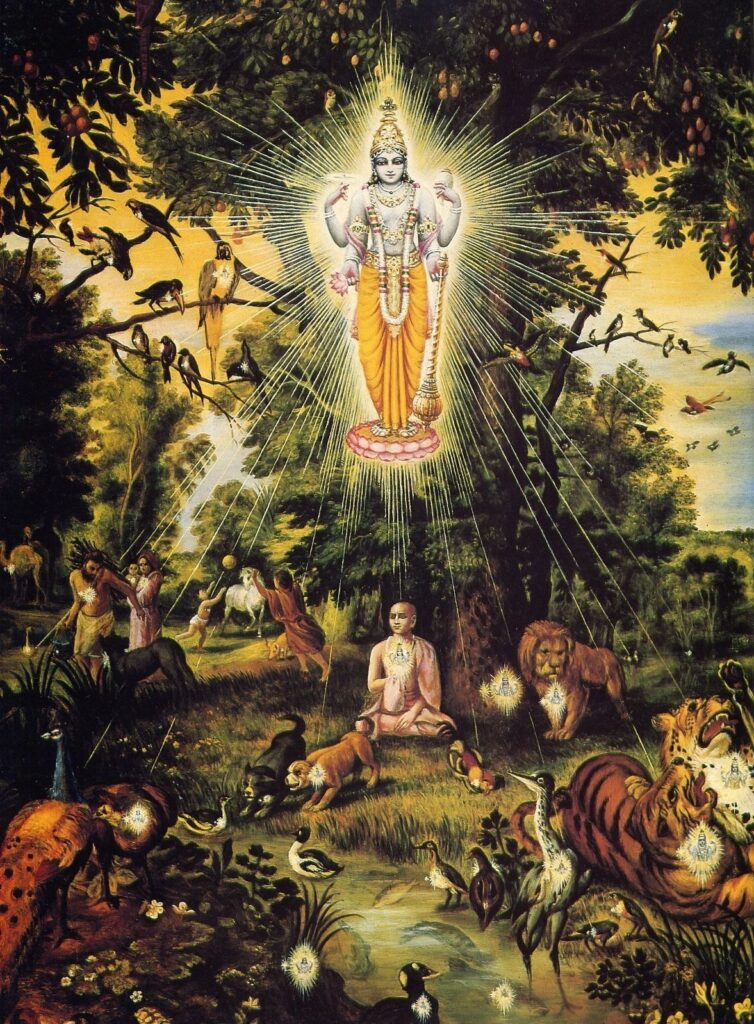
All living entities, moving and non-moving, are My expansions and are separate from Me. I am the Supersoul of all living beings, who exist because I manifest them. I am the form of the transcendental vibrations like omkara and Hare Krishna, Hare Rama, and I am the Supreme Absolute Truth. These two forms of Mine – namely the transcendental sound and the eternally blissful spiritual form of the Deity, are My eternal forms; they are not material.
[Srimad Bhagavatam 6:16:51]
The holy name of Krishna is not manifest in their (impersonalists’) mouths because they are offenders unto Krishna, the Supreme Personality of Godhead, who is identical with His holy name. The Lord’s holy name, His form and His personality are all one and the same. There is no difference between them. Since all of them are absolute, they are transcendentally blissful.
[Caitanya-caritamrta Madhya 17:130-131]
Narada Muni’s Previous Life as a Gandharva
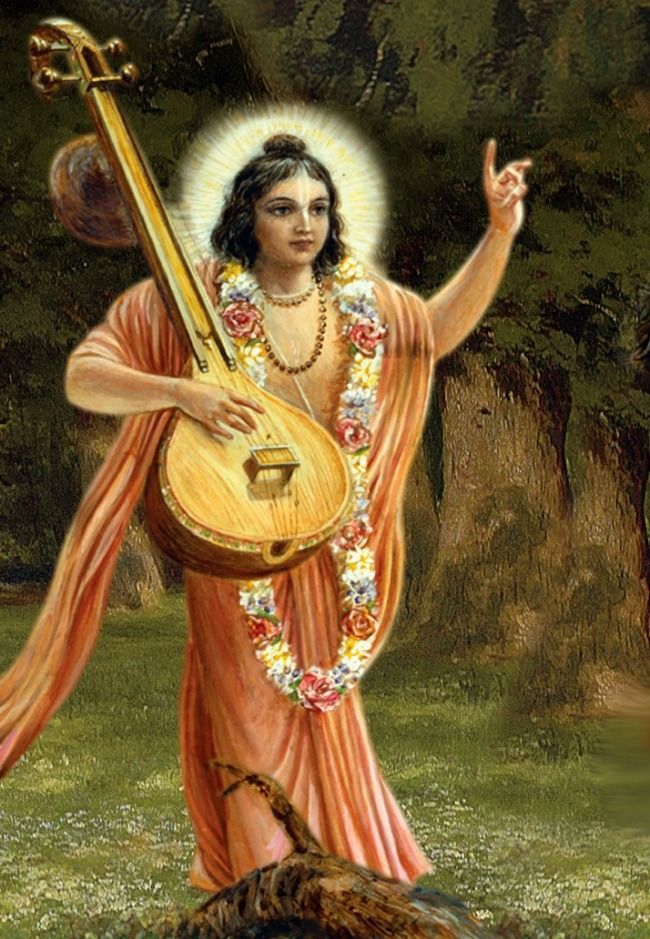
Long, long ago, in another maha-kalpa [millennium of Brahma], I existed as the Gandharva known as Upabarhana. I was very respected by the other Gandharvas. I had a beautiful face and a pleasing, attractive bodily structure. Decorated with flower garlands and sandalwood pulp, I was most pleasing to the women of my city. Thus I was bewildered, always feeling lusty desires. Once there was a sankirtan festival to glorify the Supreme Lord in an assembly of the demigods, and the Gandharvas and Apsaras were invited by the prajapatis to take part in it.

Narada Muni continued: Being invited to that festival, I also joined, and, surrounded by women, I began musically singing the glories of the demigods. Because of this, the prajapatis, the great demigods in charge of the affairs of the universe, forcefully cursed me with these words: “Because you have committed an offense, may you immediately become a sudra, devoid of beauty.” Although I took birth as a sudra from the womb of a maidservant, I engaged in the service of Vaisnavas who were well-versed in Vedic knowledge. Consequently, in this life I got the opportunity to take birth as the son of Lord Brahma.
[Srimad Bhagavatam 7:15:69-73]
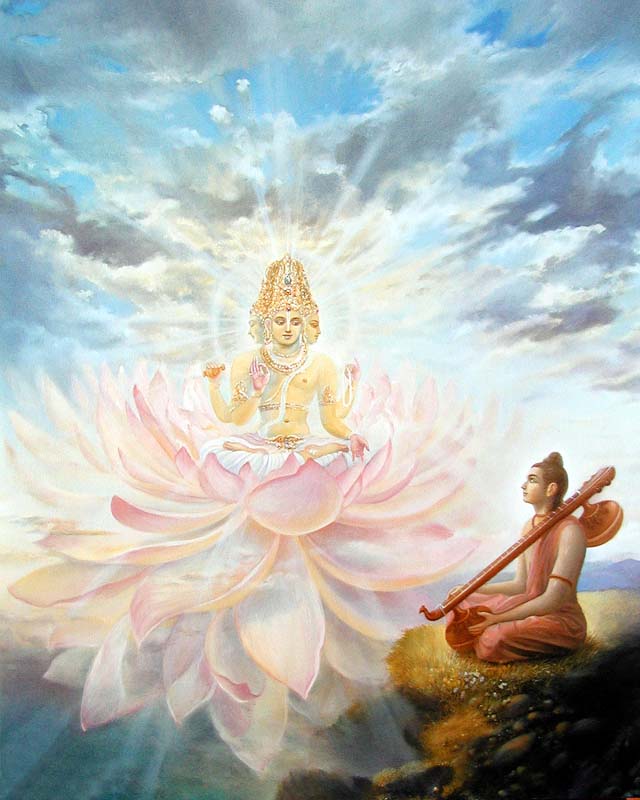
The “Ten Offences Against the Holy Names” are listed in the Padma Purana. Yet most impersonalist teachers make no distinction between chanting the names of Krishna or other Vishnu-tattva expansions of the Lord, and chanting the names of various demigods or sages or pseudo-gurus, or worshiping their forms. One such impersonalist teacher has written:
The Lord can be addressed by any name that tastes sweet to your tongue, or pictured in any name that appeals to your sense of wonder and awe. You can sing of Him as Muruga, Ganapathi (Ganesh), Sarada, Jesus, Maitreyi, Shakti (Durga); or you can call upon Allah or the Formless or the Master of all Forms. It makes no difference at all. …”
This is another offence made by many impersonalists – they think it is the same to worship Kali, Shiva, Ganesh, Krishna, or some impersonalist guru because they see them all as temporary manifestations springing from the impersonal Brahman. Such impersonalists do not accept the eternal transcendental existence of Krishna with personality and form in the spiritual world. Therefore, they cannot understand, appreciate or chant Krishna’s transcendental names, which are non-different from the Lord. Srila Bhaktivedanta Swami makes this point in his booklet “On Chanting Hare Krishna”:
… According to the material conception, there is duality between the name, form, quality, emotions and activities of a person and the person himself, but as far as the transcendental vibration is concerned, there is no such limitation, for it descends from the spiritual world. In the spiritual world there is no difference between the name of the person and the quality of the person. Of course, in the material world there is a difference. Because the Mayavadi philosophers cannot understand this, they cannot utter the transcendental vibration. …
[Srila Bhaktivedanta Swami: “On Chanting Hare Krishna”]
This is also the verdict of scripture:
If one is not actually connected with a bona fide disciplic succession, whatever mantras he chants will not bring the desired result.
[Padma Purana]
One has to learn about the beauty and transcendental position of the holy name of the Lord by hearing the revealed scriptures from the mouths of devotees. Nowhere else can we hear of the sweetness of the Lord’s holy name.
[Caitanya-caritamrta Antya 1:101]
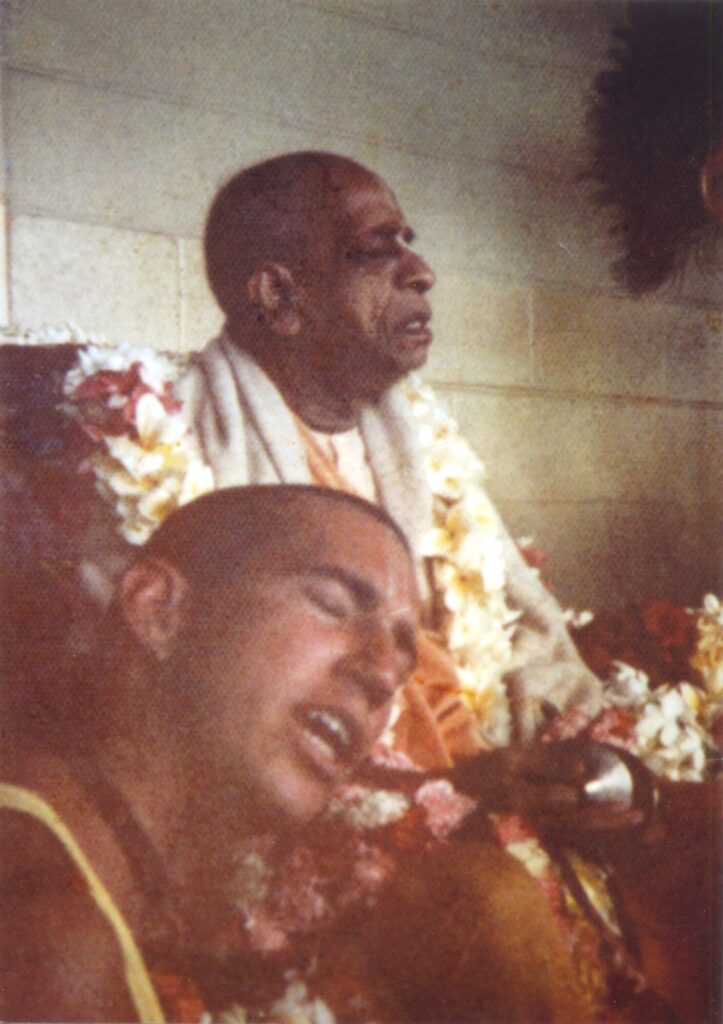
… Chanting and hearing of the transcendental holy name of the Lord cannot be performed by the ordinary senses. The transcendental vibration of the Lord’s holy name is completely spiritual. Thus it must be received from spiritual sources and must be chanted after having been heard from a spiritual master. One who hears the chanting of the Hare Krishna mantra must receive it from the spiritual master by aural reception. Srila Sanatan Goswami has forbidden us to hear the holy name of Krishna chanted by non-Vaisnavas, such as professional actors and singers, for it will have no effect. It is like milk touched by the lips of a serpent …
[From purport to Caitanya-caritamrta Antya 1:101]
O brothers, the holy name of Krishna is never to be found in the association of those who are unsaintly. The external sound of the holy name is never the name proper.
[Jagadananda Pandit: “Prema-vivarta”]
… Not having perfect knowledge of Krishna, such impersonalists certainly commit offences at His lotus feet. Therefore they do not utter the original name of the Absolute Truth, Krishna. In their impersonal way, they utter the name of the impersonal Brahman, spirit soul. In other words, they indulge in indirect indications of the Absolute Truth. Even if they happen to utter the name of Govinda, Krishna or Madhava, they still cannot understand that these names are as good as Govinda, Krishna or Madhava the person. Because they are ultimately impersonalists, their uttering of the personal name has no potency. Actually they do not believe in Krishna but consider all these names to be material vibrations …
[Purport to C.c. Madhya 17:132]
Because the Mayavadis are great offenders and atheistic philosophers, the holy name of Krishna does not come from their mouths.
[Caitanya-caritamrta Madhya 17:143]
It is also common for impersonalists to claim that they are non-different from Krishna or one of His Vishnu expansions, and this is also a great offence, as the body of the impersonalist is simply a product of the material energy, whereas the Lord’s body is completely spiritual and devoid of matter, being composed of sat, chit and ananda – eternality, knowledge and bliss. When Krishna comes to the material world, he appears in His original transcendental form:
Although I am unborn and My transcendental body never deteriorates, and although I am the Lord of all sentient beings, I still appear in every millennium in My original transcendental form.
[Bhagavag-gita 4:6]

One famous departed impersonalist teacher with millions of followers claimed to be God and to have previously been Krishna and Rama, as well as Jesus Christ. He told his followers that they too were God – but he had realised it, while they hadn’t. His body, being material, was subject to the four-fold miseries of birth, disease, old age and death. I don’t want to upset his followers, so I won’t mention his name. He said:
Rama and Krishna and [names himself] appear different because of the dress each has donned, but it is the selfsame entity, believe me.
One who considers the transcendental body of Lord Vishnu (or Krishna) to be made of material nature is the greatest offender at the lotus feet of the Lord. There is no greater blasphemy against the Supreme Personality of Godhead.
[Caitanya-caritamrta Adi 7:115]
The mayavada philosophy is so degraded that it has taken the insignificant living entities to be the Lord, the Supreme Truth, thus covering the glory and supremacy of the Absolute Truth with monism.
[Caitanya-caritamrta Adi 7:120]
Pseudo Bhakti
Many people see no difference between Krishna’s or Vishnu’s names and forms and the names and forms of the demigods or so-called bogey yogi incarnations. Thus you see altars with Krishna, Ganesh, Shiva, and Lakshmi, along with various “I am Godist” gurus. Ultimately they think that the Absolute Truth is the Impersonal Brahman, and that all names and forms spring temporarily from this source, and therefore all are equal manifestations of formless, nameless Brahman. One famous impersonalist teacher had altars in his ashrams that consisted of a mirror, so that his foolish followers could meditate upon their own forms as being God.
Such impersonalists think that “bhakti” means to develop some sentiment, some religious fervor, and that this will carry them to the point where they must then renounce the name and form they have worshiped, in order to achieve liberation by merging with the formless. Therefore, they think the name of Krishna and other Vishnu tattva forms of the Lord are only temporary material sounds, manifest only in the material world, and that no name or form can exist in the spiritual dimension – the Brahman effulgence – which is devoid of personality, form, sound and relationship. Because they have not developed bhakti, a loving service attitude towards the Supreme Person, they have no awareness of the Vaikuntha planets beyond the Brahmajyoti, where Krishna and His Vishnu-tattva expansions eternally enjoy loving pastimes with their devotees in their spiritual forms.
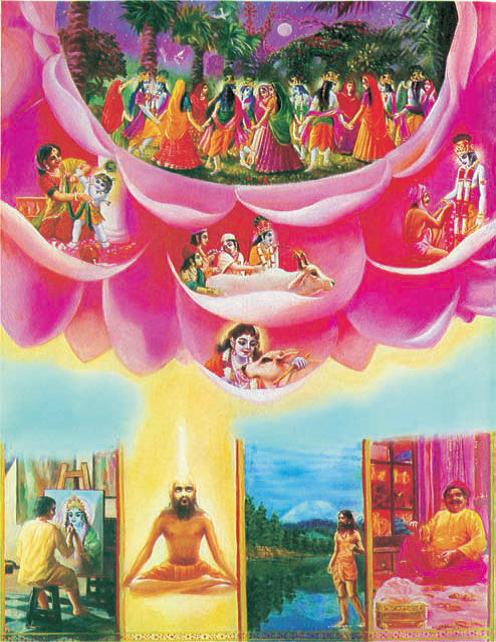
Impersonalist philosophers use the term “nirguna,” which in the Vedas means “free from material qualities.” The “gunas” are the modes or qualities of material nature – goodness, passion and ignorance. Vedic wisdom says the Absolute Truth, the Supreme Lord, and the spiritual world and its inhabitants are nirguna in the sense that they are free from material qualities and varieties. However we know that Krishna and his friends and the world that they inhabit are full of the most wonderful spiritual qualities and varieties. They are not void, zero, blank, formless, nameless nothingness.
The impersonalist simply uses the form of the deity and the name of the Lord or some demigod to attain liberation – he has no real or lasting love or attraction – it is simply a technique to attain mukti – freedom from all attachment. They will even say that in order to finally merge with the brahmajoti you have to reject the name and form you have worshiped in order to merge into the formless. This is known as “pseudo-bhakti.” It is in no way the same as the eternal transcendental love of the pure Vaisnava devotee of the Lord.

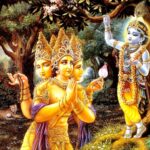
Leave A Reply